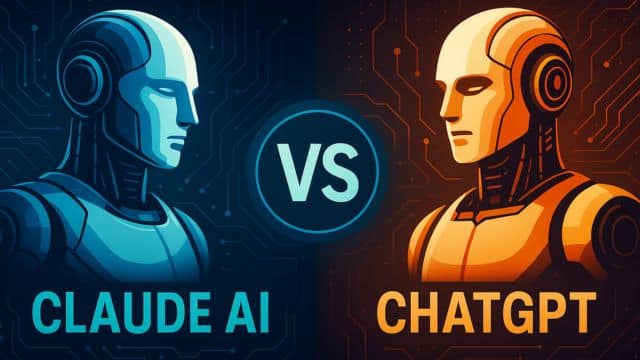Two main AI competitive in the market, Claude AI and ChatGPT, have brought artificial intelligence technology to signal a new era of advanced conversational tools. Designed by Anthropic and OpenAI respectively, these AI applications are meant to assist consumers with a broad spectrum of activities like research, writing, coding, and customer care.
Still, how do they fare? Among Claude AI vs Chatgpt which one fits your specific needs the best? This page presents a complete, objective comparison to help you decide.
Synopsis of the Background

Before diving into the details, one need first understand the background and main emphasis of these technologies.
Claude AI
Claude AI was developed by Anthropic, a company founded with great focus on AI alignment and safety. Underlining moral AI norms, this AI—which goes by the name of Claude Shannon, the “father of information theory,” aims to react intelligibly and responsibly. Its design, applying a “Constitutional AI” method, gives safety top importance, therefore assuring responsible conduct and little negative effects.
ChatGPT
Well-known for its flexible GPT architecture, OpenAI created the conversational artificial intelligence model ChatGPT. Based on OpenAI’s GPT-4 technology, ChatGPT—which has great functionality, strong features, and interoperability with a broad spectrum of tools—including plugins for enhanced capability—is hailed.
Read Also : 9 Best AI Tools for Documentation in 2025 – Ultimate Guide & Reviews
Comparison of Attributes

1. Model’s Architectural Composition
- Claude AI (Claude 3): Aims to offer meaningful involvement by means of its advanced architecture to manage large datasets and enable more in-depth conversations.
- ChatGPT (GPT-4): Keeps its supremacy by providing dynamic and contextual replies with its developed neural network.
2. Conversation Capacity
Both tools are quite good for starting natural dialogues. But whereas Claude AI has a somewhat more empathetic posture, ChatGPT is often direct and educational.
3. The Context Window
Claude AI offers a clear benefit with its context window, which lets it process and save chats covering up to 100,000 tokens. For long projects or complex questions especially, this is quite helpful. Depending on the version, ChatGPT just offers a limited amount of context despite its amazing powers.
4. Competencies in Several Modes
ChatGPT (Pro version) is helpful for a range of uses despite its limited multimodal capabilities—that is, picture interpretation. Though its present emphasis is on text-based inputs, Claude AI is rather good in understanding difficult requests.
5. Assistance with Coding
Although both systems provide programming support, ChatGPT shines because of its better debugging tools, tool integration, and support of many coding languages.
6. Voice and Characterism
The warm and cooperative tone of Claude AI is ideal for consumers looking for empathetic and safe contacts. ChatGPT is adaptable to user tastes and versatile both formally and informally.
Effectiveness
1. Precision
ChatGPT generates quite accurate findings across a range of disciplines thanks to its bigger training sample. Though in some cases this limits its assertiveness, Claude AI’s focus on safety keeps it free from frequent mistakes like “hallucinations.”
2. Velocity
Generally speaking, ChatGPT is fit for real-time applications and reacts faster. Though Claude AI’s performance is competitive, its focus on safety issues could cause it to slow a little when addressing more complex searches.
3. Contextual Retention of Memory
In this sense, Claude AI has an edge since its larger context window qualifies it more for long and difficult conversations. Although ChatGPT could struggle with long context conversations, its concise, straightforward answers help to offset this.
4. Points of Reference
Consistent strong performance on tests like MMLU and HumanEval shows ChatGPT’s adaptability across several sectors. Though it emphasizes additional goals like alignment and safety, Claude AI’s comparable benchmark data are not easily accessible.
Aligning and Safety
1. Constitutional AI for Claude
Using “Constitutional AI,” a method ensuring the AI follows moral and safe policies, Claude from Anthropic guarantees this lowers the likelihood of negative or biassed conduct.
2. ChatGPT’s Moderance Guidelines
OpenAI runs ChatGPT under rigorous moderation mechanisms, flagged filters, and user feedback to improve ethical compliance.
3. Handling Bias
Particularly taught to give justice top priority and reduce bias in responses is Claude AI. Though certain users have occasionally run across issues, ChatGPT is also actively trying to lower bias.
4. Honesty
Both systems still have improving transparency. OpenAI’s extensive documentation and Claude AI’s emphasis on safe, intelligible solutions guarantee ongoing improvement in this area.
Read Also : Boost Your Work Efficiency with These AI Productivity Tools in 2025
Cost and Availability

1. Paid vs Free Tiers
- ChatGPT offers free as well as paid versions. GPT-3.5 is available on the free tier; GPT-4 calls for a ChatGPT Plus subscription ($20/month).
- Although Claude AI offers free basic services, premium programs provide more sophisticated tools. Prices vary, but generally they are competitive.
2. Access to APIs
Both solutions provide businesses and developers APIs to be included into projects. OpenAI’s tremendous versatility is driving increasing use of its API in other sectors. The API of Claude AI shines for safer usage cases.
3. Corporate Fix
OpenAI has worked with companies all around to offer tailored business solutions. Claude AI is also building a strong reputation with scalable solutions created for businesses trying to use artificial intelligence responsibly.
Purposes
1. Content Creation & Writing
- ChatGPT excels in structured, thorough content supporting.
- Using Claude AI, one may edit and polish text with empathy.
2. Programming
ChatGPT’s great coding capacity help developers troubleshooting and fixing problems. Though Claude AI offers robust searches, its findings are more wary.
3. Customer Support
Both technologies can be useful even if ChatGPT’s capacity to connect with apps provides customer care teams an advantage.
4. Instructional Research in Education
Users interested in objective, safe academic research would be suited for Claude AI. ChatGPT is quite versatile for more broad informational demands.
Real-world Conditions
- One company might choose to use ChatGPT for plugin support.
- Organizations that value ethical artificial intelligence could use Claude AI for tasks like processing sensitive data.
Key Comparison

| Feature | Claude AI | ChatGPT |
|---|---|---|
| Who Made It | Developed by Anthropic, with a big focus on safety and ethical AI behavior. | Built by OpenAI, recognized for its innovative GPT architecture and wide market acceptance. |
| Model Strength | Claude 3 is great at handling large conversations with thoughtful responses. | GPT-4 is incredible at dynamic, context-rich replies and versatility across tasks. |
| Conversation Style | Empathetic and warm for users who want collaborative and safe chats. | More adaptable, offering professional or casual tones depending on what you ask! |
| Context Window | Handles up to 100,000 tokens – perfect for complex or long discussions. | Limited context memory, varies by version, but shorter compared to Claude AI. |
| Multimodal Skills | Focuses on text inputs with excellent comprehension of nuanced queries. | Pro version supports image inputs too, allowing for versatile problem-solving. |
| Coding Help | Strong coding assistance but errs on the cautious side. | Excels in coding tasks, debugging, and supports a wider range of programming languages. |
| Speed | Sometimes slower due to its safety-first approach to answering queries. | Generally faster, with quick responses suited for real-time needs. |
| Accuracy | Prioritizes safety, meaning it avoids risky answers but may feel less direct. | Trained on large datasets, it’s highly accurate but can sometimes “hallucinate” or make up info. |
| Bias Handling | Designed to minimize bias and deliver fair responses. | Actively works on reducing bias but has had occasional issues reported by users. |
| Free Version | Generous free tier with adequate features for most tasks. | Free tier gives access to GPT-3.5, while GPT-4 is part of a paid plan ($20/month). |
| APIs for Developers | Business API designed with safety in mind for sensitive use cases. | Widely adopted API, known for its flexibility and extensive integration options. |
| Best For | Great for ethical AI needs, sensitive data, and deep, thoughtful discussions. | Perfect for writing, coding, and businesses looking for AI integration with some creative edge. |
| Drawbacks | Slower for certain tasks, newer to the market, and still building its name. | Limited free features and can provide incorrect info during complex queries (“hallucinations”). |
| Real-life Scenarios | Ideal for those working with sensitive topics like academic research. | Businesses or developers may choose it for plugin support and wide-ranging applications. |
Bottom Line:
Claude AI is your go-to for safe, empathetic, and context-heavy interactions. On the other hand, ChatGPT shines with speed, versatility, and coding help. It all comes down to what fits your needs better!
Conclusion
Strong AI assistants both ChatGPT and Claude AI have unique benefits. If you prioritize safety, long-form context management, and empathic replies, Claude AI may be the ideal fit. For those seeking adaptable features, coding assistance, and faster response times, ChatGPT is a reliable tool.
Whether your selection is based on corporate leadership, developer, or normal user, your particular needs will always guide it. By evaluating your goals and preferences, you can completely apply these artificial intelligence tools in your workflow.
Read Also : 7 Best AI Tools for PowerShell Scripting to Make Your Workflow Effortless


